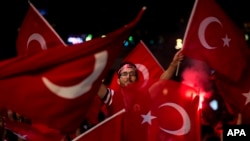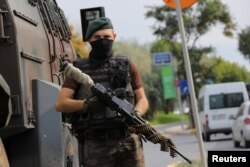Turkish-U.S. relations will not be significantly affected by last week’s failed coup and Turkey will take a “mutual benefit approach” to diplomacy between the two countries, Turkish president's chief of international relations told VOA.
In an interview, Ayse Sozen Usluer discussed Turkey’s strategy following the July 15 failed coup by members of Turkey’s military.
U.S.-Turkish relations remain strained after last Friday’s attempted coup, with accusations from members of Turkey’s ruling AK Party that the U.S. was involved in it. Usluer distanced President Recep Tayyip Erdogan from such accusations.
“There is no official idea that there are foreign powers behind the coup,” Usluer said. She claims the accusations were in response to comments made by two U.S. lawmakers - Virginia State Senator Dick Black and U.S. Congressman Brad Sherman.
”Two U.S. (lawmakers) tweeted saying that good news of the day, military attempting to oust Turkish dictator. We have all these tweets. Such messages, do not help the Turkish people. We’ve lost hundreds of lives. We expect solidarity from our friends.”
But Usluer insisted Ankara would continue working with Washington.
“It will not affect the U.S.-Turkish relations. I think our cooperation will continue, especially on our fight against Daesh,” she said, using an Arab acronym for the Islamic State group.
Usluer described the country’s approach as pragmatic, calling it a “win-win” in which both sides gain advantage.
Analysts have been speculating that the crisis threatens to unravel U.S.-Turkey relations, as Erdogan has sought the extradition of Fethullah Gulen, an Islamic preacher who lives in exile in the United States. Erdogan accuses Gulen of masterminding the coup attempt.
Gulen has denied any involvement in the military plot to topple the Turkish government and has hinted the coup might have been staged to justify his arrest.
Washington says all extradition requests require evidence and legal process. Turkish Prime Minister Binali Yildirim warned that failure to extradite Gulen would be a “warlike act.”
But Usluer acknowledged the extradition process would take time. “What is important is to show decisiveness and sincere cooperation,” she said.
Usluer said failure to extradite Gulen would result in only a limited response, with the ending of Turkey’s extradition agreement with the United States, and would not affect regional cooperation.
Usluer told VOA that in addition to the United States, Turkey would be solidifying relations with Iran and developing relations with Russia.
Unlike some of Ankara’s Western allies, Iran did not wait for the coup’s failure to speak up in support of the Erdogan government. “We will remember who helped us,” Usluer said.
WATCH: Cleric Gulen Denies Claims of Coup Involvement
In a phone call, Iranian President Hassan Rouhani told Erdogan the coup attempt was “a test to identify your domestic and foreign friends and enemies.”
"Iran’s support will affect, of course, positively our relations,” said Usluer, who acknowledged that differences remain, ”but each country will follow their own concerns in the region.”
Usluer also said Turkey would be forging closer ties with Russia. Erdogan is due to meet with Russian President Vladimir Putin next month.
The meeting follows Erdogan's apology to Moscow for Turkish jets downing a Russian bomber in November 2015, which triggered a seven-month crisis in bilateral relations.
Putin and Erdogan had their first telephone conversation since the November incident, with the parties agreeing to meet in person soon, and restrictions on travel to Turkey for Russian tourists were lifted.
U.S. Defense Secretary Ash Carter on Wednesday offered reassurances that Turkey’s alliance with the U.S. was still strong following the failed coup.
“Turkey has been a strong ally for decades, as we’ve faced together a great variety of problems, from the Cold War to today’s counter-ISIL campaign,” Carter said. “The alliance is very strong and our relationship’s very strong.”
However, it appears White House officials are uncertain about how Erdogan and his government will respond. White House spokesman Josh Earnest said Thursday, “Given the tumultuous nature of events in Turkey over the last six days, that answer is we’ll learn in the weeks ahead.”
But with the declaration of a state of emergency by Ankara, further concerns are being raised about restrictions on freedoms and rights in Turkey. The declaration allows the cabinet under the chairmanship of the president to issue decrees that have the force of law on matters relating to the emergency.
It also comes as concerns grow over the scale of the crackdowns that have targeted thousands of judges, civil servants, teachers, police officers and soldiers, and amid widespread fears of growing authoritarianism on the part of Erdogan.
Turkish officials have insisted that the measures are necessary to preserve security and stability as the country grapples with the coup’s aftermath and investigates how it came about.
Erdogan said the state of emergency was not against democracy, the rule of law or freedom.









